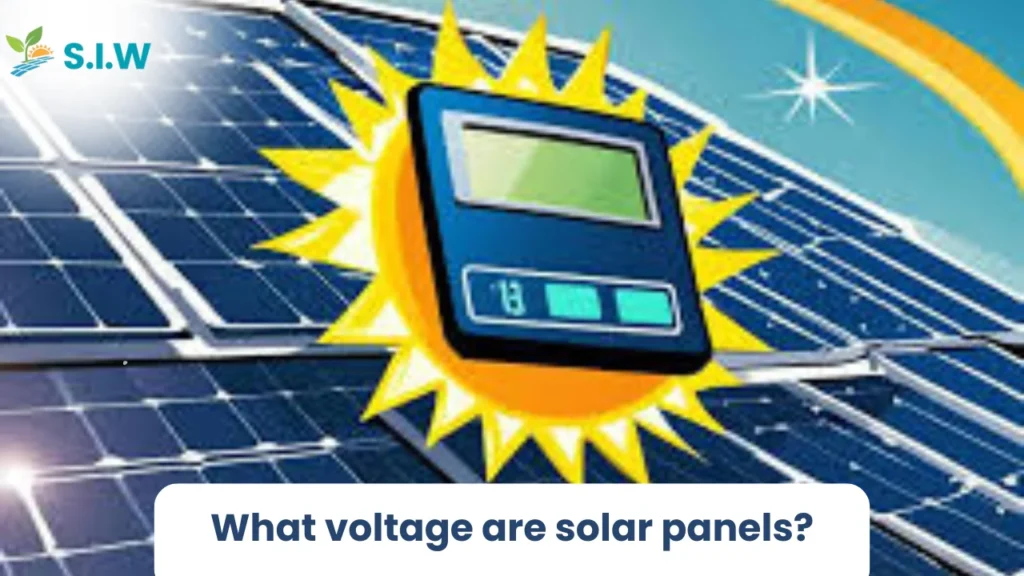Solar panels are an incredible way to capture sunlight and turn it into energy we can use every day. But, if you’re exploring solar energy for the first time, one common question might come to mind: What voltage are solar panels? Understanding this is essential since voltage plays a big role in how solar systems function and what types of devices they can power. Let’s break down the details of solar panel voltage in simple terms.
The Basics of Solar Panel Voltage
What Exactly is Voltage?
Voltage in solar panels refers to the electric potential difference, which tells us how much electrical “pressure” exists in the system to push electricity through. When sunlight hits the solar panel, it excites electrons, creating a flow of electricity. This flow, or electric potential, is measured in volts (V).
Most residential solar panels typically come in two standard voltage ratings: 12 volts and 24 volts. Commercial and industrial setups can use panels with even higher voltages to meet larger power demands.
Types of Solar Panels Based on Voltage
Common Voltages and Their Uses
Solar panels are primarily categorized by their voltage to match different applications. Here’s a closer look at these common voltage ratings and their uses:
12-Volt Solar Panels
12-volt panels are commonly used in smaller applications like RVs, boats, or off-grid setups. They’re perfect for those who don’t need massive amounts of power and prefer portability. These panels can charge 12-volt batteries and power smaller devices with ease.
24-volt panels are better suited for residential setups where you need a bit more power than the 12-volt panels provide. These panels are often used in homes or small businesses where solar power can supply energy to lights, appliances, and outlets.
For instance, a 600 Watt Solar Panel often operates at a 24-volt rating, providing enough energy to run larger household appliances.
Commercial Solar Panels
When it comes to large-scale applications, commercial solar panels tend to operate at much higher voltages, like 48 volts or more. These systems are common in industrial or agricultural setups where significant power output is required.
Why Voltage Matters in Solar Panels
Matching Panels with Inverters and Batteries
One key reason voltage matters is that solar panels need to match with the inverters and batteries in the system. The inverter converts the DC (Direct Current) from the panels to AC (Alternating Current), which powers your home. If the voltage doesn’t match the system, it could lead to energy loss or inefficiency.
How to Choose the Right Voltage for Your Needs
When selecting a panel, consider what you’re trying to power. For a small cabin, a 12-volt system may be sufficient, but for a larger setup, you may need to use a commercial solar panel to meet higher demands.
Voltage and Power Output of Solar Panels
Understanding Watts and Volts in Solar Panels
Power output, measured in watts, is determined by both volts and amps (current). For instance, a 600 Watt Solar Panel could have different voltage ratings. If it’s a 24-volt panel, it might output around 25 amps (since power = volts x amps).
Knowing the voltage helps predict how much current the panel can produce. The wattage tells you how powerful the panel is, while the voltage helps determine its compatibility with other system components.
How Solar Panel Voltage Affects Appliances and Devices
Powering High-Demand Appliances
The voltage of a solar panel can influence which appliances it can power. For example, high-demand appliances like an Induction Stove for Solar will require a robust system, often powered by 24-volt or 48-volt commercial solar panels.
Appliances like induction stoves have higher power demands than basic devices, so they need higher wattage and voltage for efficient operation.
Practical Considerations for Solar Panel Voltage Selection
Weather Conditions and Voltage Output
Solar panels typically operate efficiently in sunny weather, but overcast or shaded environments can lower voltage output. Some systems have MPPT (Maximum Power Point Tracking) controllers to adjust voltage output based on sunlight levels, making them ideal for areas with variable weather.
Storage and Battery Charging
If you plan to use batteries, choosing the right voltage is even more critical. For instance, 12-volt panels are ideal for charging 12-volt batteries, while higher-voltage setups require specific battery banks to match the panel’s voltage.
Final Thoughts
In summary, choosing the right voltage for your solar panels involves understanding your energy needs, the types of devices you plan to power, and the local climate. Whether you’re installing a 600 Watt Solar Panel for residential use or a commercial solar panel for business purposes, matching the voltage to your needs is key.
For those considering a solar setup, reaching out to a local solar provider can give you insights into the best voltage setup for your unique needs. Get a quote Now!
FAQs
- What voltage do standard residential solar panels use?
Most residential solar panels are rated at either 12 volts or 24 volts. - Can I connect a 24-volt panel to a 12-volt battery?
No, the voltage needs to match. A 24-volt panel requires a 24-volt battery system. - Does panel voltage affect energy efficiency?
Voltage itself doesn’t directly affect efficiency, but matching voltages prevents energy loss. - How does voltage impact which appliances I can run?
Higher-voltage panels can power larger appliances, like an Induction Stove for Solar setups. - What’s the best voltage for off-grid systems?
Off-grid setups typically use 12- or 24-volt panels, depending on power needs.








